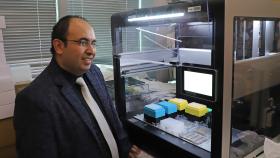A paper in the scientific journal Cell has called on the National Institutes of Health and other funding agencies to address disparities in allocating support for Black researchers. Representatives from a national network of women deans, chairs, and distinguished faculty in biomedical engineering collaborated on the call to action.
Despite studies on the distribution of National Institutes of Health (NIH) research funding to Black scientists over the past decade, little has changed. And the authors said the result is that Black faculty members’ careers stall, and they cannot achieve their full potential.
“Several reports to describe inequities had been published before, but there seemed to be very little effective action in response,” said Karmella Haynes, a co-author and assistant professor in the Wallace H. Coulter Department of Biomedical Engineering. “For instance, there are certain program announcements that aim to increase workforce diversity, but these don't receive enough funding to make a difference. Also, NIH merit review panels sometimes include black scientists like myself — and seem to have become more diverse, in general — but subsequent NIH council review, where actual finding decisions are made, is a closed process.”
Haynes pointed to a recent report in eLife, where the authors noted “[approximately] 119 applications from white [principal investigators] with scores in the 35th-59th percentile range were funded versus zero applications from Black PIs with scores in the same range.”
In the Cell paper, “Fund Black Scientists,” Haynes and her co-authors wrote that Black applicant award rates for research funding have stood at about 55 percent of that of white principal investigators of similar academic achievement. Despite internal reviews of the reasons behind this disparity, and promises to do better, the funding gap continues.
While efforts have been made to improve the pipeline to encourage Black students to prepare for and enter careers as researchers and college and university faculty, once appointed, lack of research funding can derail these careers, the authors wrote.
Many universities look at faculty members’ ability to support their research as part of decisions on tenure and promotions, so NIH funding disparities can end the careers of Black scientists. Plus, without adequate research funding, these scientists can become discouraged and leave their professions.
The effects are potentially generational — fewer Black scientists remain to serve as role models and mentors for up-and-coming researchers — and have far-reaching impacts on society.
Research questions vital to society are not being asked, because the perspectives, creativity, and knowledge of a diverse population of scientists are not being tapped. The public also does not see the faces or hear the voices of Black scientific experts speaking on important issues.
The authors of the paper made several recommendations to equalize research funding, including:
- Explicitly stating that racism persists in the U.S. research enterprise and that it must be expelled.
- Developing federal funding institute policies to immediately achieve racial funding equity.
- Incorporating diversity into research proposal scoring criteria, prioritizing research teams that exemplify diversity, and diversifying proposal review panels.
- Training funding agency leadership and staff — and grant reviewers and recipients — to recognize and stop racism.
“Scientific colleagues, let us each use our voices and actions to now overcome our profession’s racism and serve as antiracist agents of change,” the authors wrote.
Their recommendations also extended to individual scientists as well as universities, colleges, and institutes more broadly. They suggested people and organizations must recognize how they might be unintentionally contributing to systemic racism in their academic roles. Academia, they wrote, must also move forward from issuing statements of solidarity to making transformative organizational changes.
Likewise, the paper called on philanthropists, industry leaders, foundations, and professional societies to help offset racial disparities in research funding.
But in the end, Haynes said there’s only one real measure of meaningful change: “Black scientists receiving more grants that they clearly qualify for.”
The paper was written by Omolola Eniola-Adefeso at the University of Michigan and Kelly R. Stevens at the University of Washington along with Haynes, Kristyn S. Masters, University of Wisconsin-Madison; Princess Imoukhuede and Lori A. Setton, Washington University in St. Louis; Elizabeth Cosgriff-Hernandes and Shelly Sakiyama-Elbert, University of Texas at Austin; Muyinatu A. Lediju Bell, Johns Hopkins University; Padmini Rangamani and Karen Christman, University of California, San Diego; Stacey Finley, University of Southern California; Rebecca Willits and Abigail N. Koppes, Northeastern University; Naomi Chesler, University of California, Irvine; Josephine Allen, University of Florida; Joyce N. Wong, Boston University; and Hana El-Samad and Tejal Desai, University of California, San Francisco.
– Leila Gray at the University of Washington contributed to this report.
Media Contact
404.385.2416
Keywords
Latest BME News
Researchers demonstrate stem cell treatment without chemotherapy and painful bone marrow procedure
BME researchers explore the critical role of mechanical force in rare genetic disorder
Researchers develop spatial transcriptomics toolkit that provides new insights into the molecular processes of life
Air Detectives take top prize to give department three straight victories in Expo competition
Coulter BME community gathers at the Fabulous Fox to celebrate anniversary of unique public-private partnership
Coskun pioneering new research area and building a company around iseqPLA technology
BME undergraduate student and competitive skater Sierra Venetta has found success on and off the ice
BME researcher Ankur Singh using new technology to uncover weakened response in cancer patients








